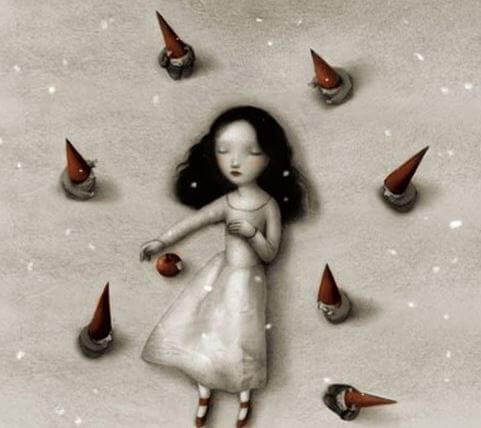If It Doesn't Generate Fear, It's Probably Not Worth It

Sometimes, in order to achieve your dreams, you have to negotiate with fear. You have to live with your fears. Although, not all of them block or limit you and make you give up on your goals. Many produce a sensation of vertigo, which indicates that you’re peering over a high cliff. It lets you know you’re full of adrenaline and unknown sensations.
That feeling of uncertainty and anxiety appears when something truly motivates us. Fear shakes us out of our routine. Because, it wishes to transform your life into something meaningful. Fear marks out the path we should follow. It urges us it keep testing the limit between what’s possible and what’s impossible. It does so in an attempt to make it come true.
Fear, the emotion that frightens us
Gerald Hüther, in his book “Biologie der Angst” (“The Biology of Fear” in English), explains how we don’t fear anything as much as we fear our fears. However, it is precisely this emotion, in all of its nuances, which puts our intellectual and emotional development into motion. Fear produces a stress reaction within the brain. This creates the suitable conditions for intellectual, emotional and physical behavior.
We should be capable of finding the limit between friendly and protective fear and pathological fear. The kind which leads to panic attacks and anxiety.

Quantum physics explains how the body and emotions can’t distinguish between what is happening in the real and imaginary worlds. Thus, our brain unleashes the same reactions. So, we suffer in exactly the same way the effects of stress and other biological mechanisms. Regardless of whether we experience something, anticipate it or simply imagine it.
The complex circuit of fear in our body: a mix of stress and pleasure
As we have just mentioned, fear appears as a completely maladaptive sensation when it becomes a suffocating and continuous emotional state, instead of serving as an alarm signal for potential threatening stimuli from the external world. It oppresses people in a circle of their own unpleasant sensations, when it can no longer distinguish- adaptively- between instances of alarm and relaxation.
The complex process and physical and hormonal circuit of stress becomes activated through sensorial stimuli. Such as through the sense of sight or hearing, to send information to a part of the brain called the amygdala. This structure connects with the hypothalamus in order to access memory and see what happened in similar situations in the past. Also, it is in charge of sending electric impulses to our muscles in order to initiate action.

On the emotional front, the pituitary gland secretes stress hormones. These activate us and produce two other hormones: cortisol and adrenaline. Adrenaline dilates your pupils and increases the respiratory rate. Cortisol, on the other hand, increase glucose levels in the blood, which generates more muscular energy.
The most interesting thing about this complex circuit is that, in the end, it generates dopamine. This is a neurotransmitter associated with pleasure, which in turn accompanies the sensation of fear, risk and triumph.
When fear stops working: a sign of catastrophe
Knowing this complex circuit of fear and its utility, not only for our survival, but also for our emotional well-being, it is normal that people who have suffered harm after being afraid feel that this warning sign is not very valuable. Because, even though they anticipated the danger, they were still unable to do anything.
For example, people who were victims of aggression. If the damage they experienced is not emotionally processed, their fear will remain permanently activated, even for events that pose no threat. People can also experience this if they have witnessed an act in which the resources used to escape have not worked.
Making fear an ally in order to achieve pleasure
In the cases in which fear hasn’t worked as an adaptative sign, but rather as a generalized sensation that causes an enormous discomfort, it should be treated correctly. In the cases in which a trauma has transpired, techniques such as EMDR along with other techniques seem to yield promising results. In any case, the best advise we can give is that you seek out a specialist.
Fear serves as a matter of anticipation, never as a way to live your life. As we mentioned in the beginning of this article, the ideal is for it to be a sensation that shows us the precipice and unused roads, but without simply following an arrow without asking questions.

It would be similar to the fear we feel in the face of goals that seem unattainable, but which we know aren’t. That’s what someone feels before embarking on a career that requires years of studying. Or what a runner feels who is trying to beat his previous personal speed record. Cortisol activates but doesn’t block or limit them.
Thus, the possibility of transforming fear into your ally can become, if you are capable of materializing it, a wonderful achievement. You will be able to value the warning signs it gives you without obeying them blindly. Feeling that sense of alarm as present and real, but also facing it and knowing how to move through it. One day you may not be able to avoid what you fear, nor will you be able to confront it, but you must decondition that experience in order to live the rest of them fully.
At the end of the day, if fear didn’t exist, neither would the sensation of success or accomplishment. If you avoid one, you are avoiding the other, with the same results: avoiding life. Allow yourself to experience and tolerate this emotion. Rest assured that it will bring interesting things into your life.
Sometimes, in order to achieve your dreams, you have to negotiate with fear. You have to live with your fears. Although, not all of them block or limit you and make you give up on your goals. Many produce a sensation of vertigo, which indicates that you’re peering over a high cliff. It lets you know you’re full of adrenaline and unknown sensations.
That feeling of uncertainty and anxiety appears when something truly motivates us. Fear shakes us out of our routine. Because, it wishes to transform your life into something meaningful. Fear marks out the path we should follow. It urges us it keep testing the limit between what’s possible and what’s impossible. It does so in an attempt to make it come true.
Fear, the emotion that frightens us
Gerald Hüther, in his book “Biologie der Angst” (“The Biology of Fear” in English), explains how we don’t fear anything as much as we fear our fears. However, it is precisely this emotion, in all of its nuances, which puts our intellectual and emotional development into motion. Fear produces a stress reaction within the brain. This creates the suitable conditions for intellectual, emotional and physical behavior.
We should be capable of finding the limit between friendly and protective fear and pathological fear. The kind which leads to panic attacks and anxiety.

Quantum physics explains how the body and emotions can’t distinguish between what is happening in the real and imaginary worlds. Thus, our brain unleashes the same reactions. So, we suffer in exactly the same way the effects of stress and other biological mechanisms. Regardless of whether we experience something, anticipate it or simply imagine it.
The complex circuit of fear in our body: a mix of stress and pleasure
As we have just mentioned, fear appears as a completely maladaptive sensation when it becomes a suffocating and continuous emotional state, instead of serving as an alarm signal for potential threatening stimuli from the external world. It oppresses people in a circle of their own unpleasant sensations, when it can no longer distinguish- adaptively- between instances of alarm and relaxation.
The complex process and physical and hormonal circuit of stress becomes activated through sensorial stimuli. Such as through the sense of sight or hearing, to send information to a part of the brain called the amygdala. This structure connects with the hypothalamus in order to access memory and see what happened in similar situations in the past. Also, it is in charge of sending electric impulses to our muscles in order to initiate action.

On the emotional front, the pituitary gland secretes stress hormones. These activate us and produce two other hormones: cortisol and adrenaline. Adrenaline dilates your pupils and increases the respiratory rate. Cortisol, on the other hand, increase glucose levels in the blood, which generates more muscular energy.
The most interesting thing about this complex circuit is that, in the end, it generates dopamine. This is a neurotransmitter associated with pleasure, which in turn accompanies the sensation of fear, risk and triumph.
When fear stops working: a sign of catastrophe
Knowing this complex circuit of fear and its utility, not only for our survival, but also for our emotional well-being, it is normal that people who have suffered harm after being afraid feel that this warning sign is not very valuable. Because, even though they anticipated the danger, they were still unable to do anything.
For example, people who were victims of aggression. If the damage they experienced is not emotionally processed, their fear will remain permanently activated, even for events that pose no threat. People can also experience this if they have witnessed an act in which the resources used to escape have not worked.
Making fear an ally in order to achieve pleasure
In the cases in which fear hasn’t worked as an adaptative sign, but rather as a generalized sensation that causes an enormous discomfort, it should be treated correctly. In the cases in which a trauma has transpired, techniques such as EMDR along with other techniques seem to yield promising results. In any case, the best advise we can give is that you seek out a specialist.
Fear serves as a matter of anticipation, never as a way to live your life. As we mentioned in the beginning of this article, the ideal is for it to be a sensation that shows us the precipice and unused roads, but without simply following an arrow without asking questions.

It would be similar to the fear we feel in the face of goals that seem unattainable, but which we know aren’t. That’s what someone feels before embarking on a career that requires years of studying. Or what a runner feels who is trying to beat his previous personal speed record. Cortisol activates but doesn’t block or limit them.
Thus, the possibility of transforming fear into your ally can become, if you are capable of materializing it, a wonderful achievement. You will be able to value the warning signs it gives you without obeying them blindly. Feeling that sense of alarm as present and real, but also facing it and knowing how to move through it. One day you may not be able to avoid what you fear, nor will you be able to confront it, but you must decondition that experience in order to live the rest of them fully.
At the end of the day, if fear didn’t exist, neither would the sensation of success or accomplishment. If you avoid one, you are avoiding the other, with the same results: avoiding life. Allow yourself to experience and tolerate this emotion. Rest assured that it will bring interesting things into your life.
This text is provided for informational purposes only and does not replace consultation with a professional. If in doubt, consult your specialist.







